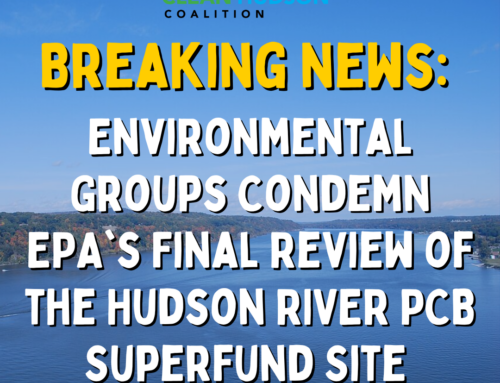|
On Friday, July 8th the NYS Department of Public Service Staff released a revised Clean Energy Standard proposal that would subsidize unprofitable and aging nuclear reactors in upstate NY. This updated proposal, Case #15-E-0302, is estimated to cost New York ratepayer $1 billion dollars over the first two years, and could cost as much as $7.6 billion in steadily increasing subsidies by 2029.
The revised proposal now allows Indian Point, which was previously excluded, to be added in in 2019; this could increase the bailout by additional $3.5 billion!
These costs will be paid by every electricity consumer in New York — residents, businesses, and municipalities through higher energy bills. This proposal would force all electricity consumers in New York to spend $2 on nuclear subsidies for every $1 put toward programs for renewable energy and energy efficiency, and even if people opt for 100% renewable energy through their electricity provider, they will be charged a mandatory commodity surcharge for so called “Zero-Emission Credits” (ZECs) on their utility bill. If you consider the fossil fuel used to mine, mill, enrich, transport nuclear fuel and to store increasing amounts of high-level radioactive waste, nuclear energy is certainly not emission free!
This is your opportunity to join Clearwater in speaking out against this subsidy. Public comments are due Friday, July 22. Below is a template that you may use or adapt; we are also still calling for an extension to be granted. The Public Service Commission is rushing to try to make a decision by August 1. This is not a decision to be made in haste!
With your support, we can make our concerns heard. If California can commit to replacing Diablo Canyon nuclear plant with 100% renewable energy, while protecting union workers jobs in a just and orderly transition — with no ratepayer subsidy — why can’t New York? If Illinois could see that Exelon Corporation’s demand for subsidies was a way to pad the company’s profits, why isn’t NY being more careful? We ask you to take these three steps with us this week: Step 1: We need thousands of people to comment by the Friday, July 22deadline. Our colleagues at AGREE have created a website that allows a one-click sign on letter. This can be shared with your lists and posted on Facebook.
Step 2: If you want to be more thorough, please see Clearwater’s recommended letter below and the memorandum that is attached and cut and paste to send your own version directly to the PSC Secretary. These can be from an individual (use “I”) or an organization (“We). Step 3: We are asking all clean energy allies to participate in a call-in to Governor Cuomo this week: (518) 474-8390.
|
|
SAMPLE LETTER
Letters urging the New York State Public Service Commission to reconsider the proposed mandatory nuclear subsidies and requesting an extension of the period for public comment should be submitted by email to secretary@dps.ny.gov, and addressed to:
Hon. Kathleen H. Burgess
Secretary to the Commission
New York State Public Service Commission
Three Empire State Plaza
Albany, New York 12223-1350
Dear Secretary Burgess:
[I/We] request that the NY State Public Service Commission reconsider the recommendations in the Staff’s Responsive Proposal for Preserving Zero-Emissions Attributes in Case 15-E-0302 for a mandatory nuclear subsidy that is estimated to cost New Yorkers more than $7 billion over the course of the next 12 years.
The California Public Utility Commission recently created a plan to phase out their last nuclear power plant, by facilitating a joint agreement between Pacific Gas & Electric, the unions representing the plant workers, environmental groups and municipal officials, which will replace the power generated by Diablo Canyon with 100% renewable energy and energy efficiency over the course of nine years, while protecting the workers’ jobs and providing for retraining where needed, without mandating any subsidy that ratepayers would fund.
New York has no such plan, yet the Department of Public Service is proposing to impose an estimated $7.6 billion subsidy to underwrite the currently unprofitable operation of FitzPatrick, Ginna, and Nine Mile Point nuclear power stations. Staff’s proposal, originally estimated to cost of between $59 and $658 million over the first seven years, has now been revised to cost an estimated $953 million for only the first two years. The subsidy rate charged to ratepayers will escalate from $17.48 per MWh in 2017-2019 to $29.15 per MWh in 2027-2029 (depending on energy and capacity price adjustments), locking New York ratepayers into a huge subsidy over the course of the next 12 years.
Staff’s proposal now also considers including Indian Point, which the NY State Department of State has determined to be inconsistent with the Coastal Management Plan for environmental and economic reasons, and unnecessary to maintain reliability. Including Indian Point in the proposed nuclear subsidy could add another $4 billion to the total cost of its proposal, which would be funded by ratepayers, including residents of all income levels, large and small businesses, non-profits, and municipalities. In the Mid-Hudson region, this would compound already high rates and the Lower Hudson Capacity Zone surcharge.
Because the Load Serving Entities – the utilities and Energy Service Companies (ESCOs) – would be required to bill their customers for the so-called Zero Emission Credits (ZECs), customers would no longer have the option of choosing to purchase 100% renewable energy, because they would be forced to pay the nuclear surcharge regardless of whether or not they want to purchase nuclear power.
By referring to nuclear power as having zero-emission attributes, the Staff’s proposal ignores emissions generated in mining, milling, transporting and storing nuclear fuel, and the planned and unplanned releases of radioactive isotopes and other emissions associated with nuclear operations. The proposal likewise ignores the creation of high-level radioactive waste in the form spent nuclear fuel rods, which will likely be stored in New York State for many decades. It also exaggerates the reliability of aging nuclear facilities, which have recently experienced increasingly frequent outages due to leaks, fires, electrical problems, and, in the case of Indian Point, severely degraded baffle-former bolts inside the reactor.
The Staff report also leaves many unanswered questions regarding the actual cost that will be borne by ratepayers and how this will affect our economy, especially for low and moderate income families, businesses who operate on the margin and municipalities with stretched budgets that are capped.
[I/We] urge the Public Service Commission to deny the Staff’s Responsive Proposal for Preserving Zero-Emissions Attributes in its current form. Because the Staff’s recommendations will have significant economic impacts on the [MUNICIPALITY] and our constituents, [I/we] also request that the PSC extend the deadline for filing comments on the Staff’s proposal to the full 45-days, as is customary under State Administrative Procedures Act (SAPA), to allow adequate time to review the substantial changes contained in this proposal.
Sincerely,
[NAME]
[TITLE, if any]
[ORGANIZATION, if any]
[CONTACT INFO]
You can also file this comment directly on line HERE.
If you do send in comments, please forward a copy to Mannajo@clearwater.org.
|





